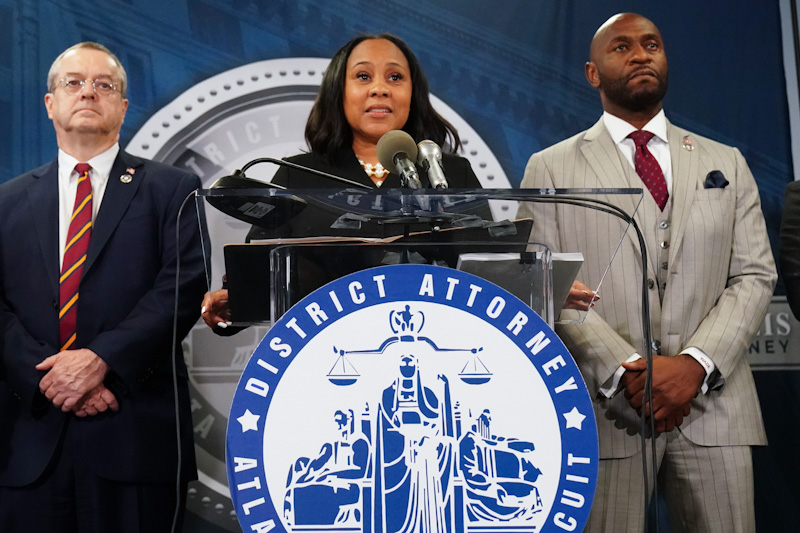Georgia indictment bolstered by broad state law on racketeering

Fulton County, Georgia, District Attorney Fani T. Willis, center, speaks in the Fulton County Government Center during a news conference Aug. 14 in Atlanta. Former President Donald Trump and several allies have been indicted in Georgia over efforts to overturn his 2020 election loss in the state. Photo by John Bazemore/The Associated Press.
The Georgia district attorney who obtained an indictment of former President Donald Trump is known for her use of the state’s broad racketeering law.
Fulton County, Georgia, District Attorney Fani T. Willis has used the Georgia Racketeer Influenced and Corrupt Organizations Act law against Atlanta educators in a test-cheating scandal, against rappers Young Thug and Gunna, and against members of the Drug Rich street gang.
Now, Trump and 18 other defendants are all charged with Georgia RICO violations in the Aug. 14 indictment.
The New York Times, the Washington Post, Axios and the Associated Press have stories on the RICO law that she used.
Defendants convicted of racketeering in Georgia can be sentenced to five to 20 years in prison and fined. That penalty is in addition to any sentence for underlying crimes that were part of the RICO conspiracy.
The indictment alleges that the defendants committed a variety of crimes in a RICO conspiracy to change the outcome of the 2020 election, including making false election claims to Georgia lawmakers and officials, creating fake documents supporting fake Trump electors, harassing an election worker, breaching voting machines to steal data, and pressuring then-Vice President Mike Pence.
The RICO law allows prosecutors to “bundle together” crimes by several people that further the objectives of a corrupt enterprise, the New York Times explains. Prosecutors must show participation in an “enterprise” through a “pattern of racketeering activity.” The “enterprise” doesn’t have to be a criminal organization.
The state would have to prove that Trump headed the enterprise but not that he was aware of the crimes.
“It allows a prosecutor to go after the head of an organization, loosely defined, without having to prove that that head directly engaged in a conspiracy or any acts that violated state law,” said Michael Mears, a professor at the John Marshall Law School in Atlanta, in an interview with the New York Times. “If you are a prosecutor, it’s a gold mine. If you are a defense attorney, it’s a nightmare.”
The RICO law in Georgia is one of the broadest in the nation, according to the Washington Post. A defendant doesn’t have to “set foot in Georgia” to be charged. And the Georgia law is broader than the federal RICO statute because of the types of crimes that are considered racketeering activity. The federal law lists 35 offenses that can constitute racketeering, while Georgia lists 65, according to Axios.
Write a letter to the editor, share a story tip or update, or report an error.



